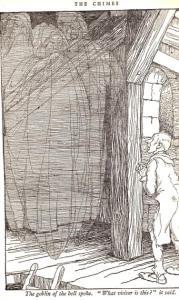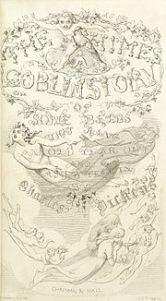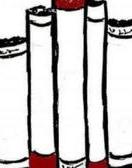I have The Chimes on The Landing Book Shelves, in two editions. The one that I have had for the longest time is an abridged version contained within The Children’s Treasury of Classics, mentioned in a previous post. A second version is in an edition of Dickens’ Christmas Books (Collins Clear Type Press) that I bought second hand in Birmingham. It has no publication date printed inside (Collins brought this collection out in 1906 but I am not sure if my copy dates from then) but there is an inscription dated 1967. Both versions of the story are illustrated with black and white sketches; the latter is by Arthur. A. Dixon and the former by an un-credited artist. I must have read the children’s story at one time but I didn’t recall it very well, when I came to re-read the unabridged version recently. The drawings of The Treasury did however stay in my memory, the daunting image of the ghostly figures made quite an impression on me as a youngster. Dixon did not do an illustration of the ghosts so I don’t have a comparison to make. You can check out the link above to see his work for the Christmas Books and other Dickens works in the Collins editions.
Dickens wrote this story in 1844, after the publication of A Christmas Carol and a year before he wrote The Cricket on the Hearth. As I featured the first of Dickens’ Christmas stories here previously I thought that it was high time that I moved on to the next one in the series. Actually, The Chimes is more of a New Year’s tale as it is set just as the old year is preparing to give way to the new. People are settling their accounts so that they may begin the New Year afresh. However, The Chimes is similar to its predecessor in that it is also a seasonal ghost story. A series of spirits show the main protagonist Toby (Trotty) Veck the error of his ways in the manner similar to that suffered by Mr Scrooge. Unlike wealthy but misanthropic Scrooge, the likeable Trotty is a poor ticket porter who struggles to earn more than a few pennies a day. His crimes against his fellow humans are less than are Scrooge’s but despite this, the spirits from the church bell tower take him to task over the course of an eventful New Year’s Eve.
But what are Trotty Veck’s crimes against humanity? Trotty is judged to be guilty that day of losing all hope in the future, of believing that the poor must really be as bad as the newspapers and the paternalistic middle classes say they are, and of losing compassion for the desperate plight of others of his class. Toby was sitting reading the paper on New Year’s Eve and he came to a report about a woman who was so desperate not to return to the workhouse that she tried to drown herself and her baby (Dickens was inspired by a real case):
“Unnatural and cruel!” Toby cried. “Unnatural and cruel! None but people who were bad at heart, born bad, who had no business on the earth, could do such deeds. It’s too true, all I’ve heard to-day; too just, too full of proof. We’re bad!”
The chimes took up the words so suddenly – burst out so loud, and clear, and sonorous- that the bells seemed to strike him in his chair.
And what was that they said?
“Toby Veck, Toby Veck, waiting for you, Toby! Toby Veck, Toby Veck, waiting for you, Toby! Come and see us, come and see us! Drag him to us, drag him to us! Haunt and hunt him, haunt and hunt him! Break his slumbers, break his slumbers! Toby Veck, Toby Veck, door open wide, Toby! Toby Veck, Toby Veck, door open wide, Toby-“ Then fiercely back to their impetuous strain again, and ringing in the very bricks and plaster on the walls.

First edition
The spirits of The Chimes show Trotty a glimpse of the future, or at least a version of it. They tell him that he has been dead for nine years after falling from the church steeple. The future presented by the spirits turns to out to be very bleak for Trotty’s family and friends. I don’t want to give any more away to anyone who has not read this story, so I will just hint that if you think about Scrooge’s prospects after the spirits have visited then you may reassure yourself before you read.
The story has been overshadowed by the success of that of Ebenezer Scrooge, though The Chimes was very well received upon publication. I can’t help thinking that the spirits were rather hard on poor old Toby, but Dickens was making the point that Toby shouldn’t give up hope and start to believe that the poor were not entitled to a better existence. Dickens was also satirising those who people claimed to be friends of the poor – as long as they stayed in their place:
Oh, let us love our occupations,
Bless the squire and his relations,
Live upon our daily rations,
And always know our proper stations.
This nineteenth century story still has something to offer us and gives us an apt lesson for the beginning of the New Year. Less a resolution than a philosophy of life.
Happy New Year!
Credit: Additional illustration from Wikipedia, with thanks.

